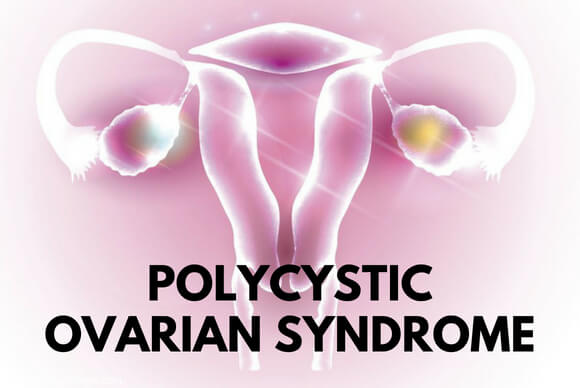Polycystic Ovarian Syndrome
What is Polycystic Ovarian Syndrome?
Polycystic Ovarian Syndrome is a medical condition in which hormone levels are altered. The condition is an imbalance between androgens and estrogens in females that affects the functioning of ovaries and may interfere with fertility or ability to conceive.
Polycystic Ovarian Syndrome is a fairly common disorder among young and teenage girls particularly women in their reproductive ages. Polycystic means many cysts. In Polycystic Ovarian Syndrome, several small follicles are formed in the ovaries but these follicles are unable to release eggs on a regular basis. The disorder begins when the ovaries or adrenal gland of women begins to produce higher amounts of male hormones i.e. androgen than normal.
The imbalance of hormone results in menstrual irregularities, growth of hairs on body and face and infertility in women.
Causes of Polycystic Ovarian Syndrome:
It is still not clear what causes Polycystic Ovarian Syndrome; however; it is believed that genes, insulin resistance and inflammation are associated with androgen production. And excess androgen production plays a major role in the pathogenesis of Polycystic Ovarian Syndrome
Sign and symptoms of Polycystic Ovarian Syndrome:
For some women, the symptoms of having Polycystic Ovarian Syndrome might start to appear when their menstruation begins. However, some women only find out that they have Polycystic Ovarian Syndrome when they experience difficulty in conceiving or they gain excess weight.
The common symptom of Polycystic Ovarian Syndrome includes:
- Irregular menstruation cycle:
One of the most common signs of having Polycystic Ovarian Syndrome is irregular, disturbed and prolonged cycles because ovulation not occur properly due to which uterine lining doesn’t shed every month. You might have less than eight cycles in a year, and bleeding may last for more than eight days, heavy bleeding than normal, infrequent periods.
- Excess hairs:
More than 70 percent of women with Polycystic Ovarian Syndrome experience growth of excess hairs on their face or entire body due to overproduction of androgen hormones.
- Acne:
Due to elevated level of male hormones, women suffering from PCOS often complaints that their skin has become oily and pimples appear on face, chest, back etc.
- Baldness:
Thinning of hairs and baldness is also a very notable sign of Polycystic Ovarian syndrome.
- Weight gain:
Most women with Polycystic Ovarian syndrome gains weight and become obese.
- Skin darkening:
Dark skin patches appear on certain areas like groin, neck, under the breast etc.
- Headache:
Due to imbalance hormone some women experience recurrent episodes of headaches and migraine attacks.
Diagnosis:
Doctors usually look for three major symptoms to diagnose Polycystic Ovarian Syndrome in women these are;
- Elevated androgen levels.
- Irregular menstruation.
- Ovarian cysts.
Some physical signs like growth of facial hairs, dark patches on skin, weight gain etc. are also examined by doctors to diagnose Polycystic Ovarian Syndrome.
Other tests include:
- Pelvic exam:
A pelvic exam is done by inserting fingers in your vagina to check for any abnormal growth in ovaries and uterus.
- Blood test:
A blood test is conducted to check your hormone level.
- Ultrasound:
An ultrasound is done to analyze any abnormal follicles or cysts in the ovaries.
Complications:
Some of the major complications of Polycystic Ovarian Syndrome includes, an increased risk of
- Infertility.
- Miscarriage
- Developing high blood pressure
- Developing High cholesterol
- Developing Type 2 diabetes
Treatment:
One of the most important treatment protocols in the management of PCOS is to, reduce weight, avoid sweet and sugary foods, avoid processed foods, exercise daily, quit smoking and adopt a healthy lifestyle.
Some medical treatment includes:
- Birth control pills to regulate periods and reduce the intensity of PCOS symptoms like acne or hair growth.
- Metformin (Glucophage, Fortamet): These pharmacological agents helps in regulating insulin levels.
- Hair removal medicines: Drugs like Elfornithine is a cream that helps in reducing hair growth. Besides drugs, there are a number of other treatment options like Electrolysis and Laser therapy is also recommended to eliminate excess hairs.
- Clomiphene: This drug is advised to women who are looking to conceive, as it induces ovulation
- Surgery: if other medicines and treatments are not effective for Polycystic Ovarian Syndrome then doctors recommend surgery in which laser or heated needle is used, to make small holes in the ovary to reinstate ovulation.
When to see a doctor:
You should immediately consult a gynecologist if you are experiencing infrequent and irregular periods, heavy bleeding, weight gain, facial hairs or difficulty in conceiving. Earlier treatment is necessary to avoid further complications.

